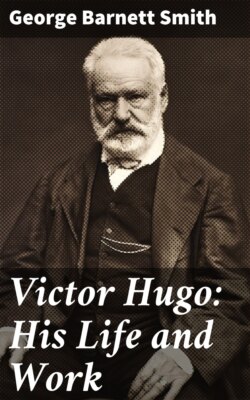Victor Hugo: His Life and Work

Реклама. ООО «ЛитРес», ИНН: 7719571260.
Оглавление
George Barnett Smith. Victor Hugo: His Life and Work
Victor Hugo: His Life and Work
Table of Contents
CHAPTER I. EARLY YEARS
CHAPTER II. DAWNINGS OF GENIUS
CHAPTER III. VICTOR HUGO'S HUMANITARIANISM
CHAPTER IV. THE TRIUMPH OF ROMANTICISM
CHAPTER V. 'NOTRE-DAME DE PARIS.'
CHAPTER VI. 'MARION DE LORME' AND OTHER DRAMAS
CHAPTER VII. LAST DRAMATIC WRITINGS
CHAPTER VIII. THE FRENCH ACADEMY
CHAPTER IX. PERSONAL AND POLITICAL
CHAPTER X. THE POET IN EXILE
CHAPTER XI. IN GUERNSEY.—'LES MISÉRABLES.'
CHAPTER XII. LITERARY AND DRAMATIC
CHAPTER XIII. PARIS AND THE SIEGE
CHAPTER XIV. 'QUATRE-VINGT-TREIZE.'—POLITICS, ETC
CHAPTER XV. POEMS ON RELIGION
CHAPTER XVI. PUBLIC ADDRESSES, ETC
CHAPTER XVII. 'LA LÉGENDE DES SIÈCLES,' ETC
CHAPTER XVIII. HONOURS TO VICTOR HUGO
CHAPTER XIX. PERSONAL AND MISCELLANEOUS
CHAPTER XX. THE POET'S DEATH AND BURIAL
CHAPTER XXI. GENIUS AND CHARACTERISTICS
Отрывок из книги
George Barnett Smith
Published by Good Press, 2021
.....
A course of the Théâtre de Voltaire led him to begin a new tragedy, Athéli; or, the Scandinavians, all in dramatic order, with its five acts, and its due regard to narrative, scenery, etc. Before he had completed it, however, he turned to a comic opera, A Quelque Chose Hasard est Bon. Then he reverted to the drama, and wrote a play in three acts, with two interludes, entitled Inez de Castro. From the point of view of literary art, little is to be said of these things; but there are many scattered passages in them which reveal remarkable insight on the part of one so young. In the year 1817 he first sought publicity for his compositions, competing for the poetical prize annually offered by the French Academy. The subject chosen was, The Advantages of Study in every situation of Life, and amongst the competitors were Lebrun, Delavigne, Saintine, and Loyson, who all on this occasion made their poetical debut. The first prize was divided between Saintine and Lebrun, and Hugo received honourable mention; but when the poems came to be declaimed in public, the warmest applause followed that by Victor Hugo. The Academy judges were considerably puzzled by Master Hugo's exercise. In one place he wrote as though he had arrived at years of discretion and comparative maturity, and then demolished this idea by the lines—
'I, who have ever fled from courts and cities,
.....